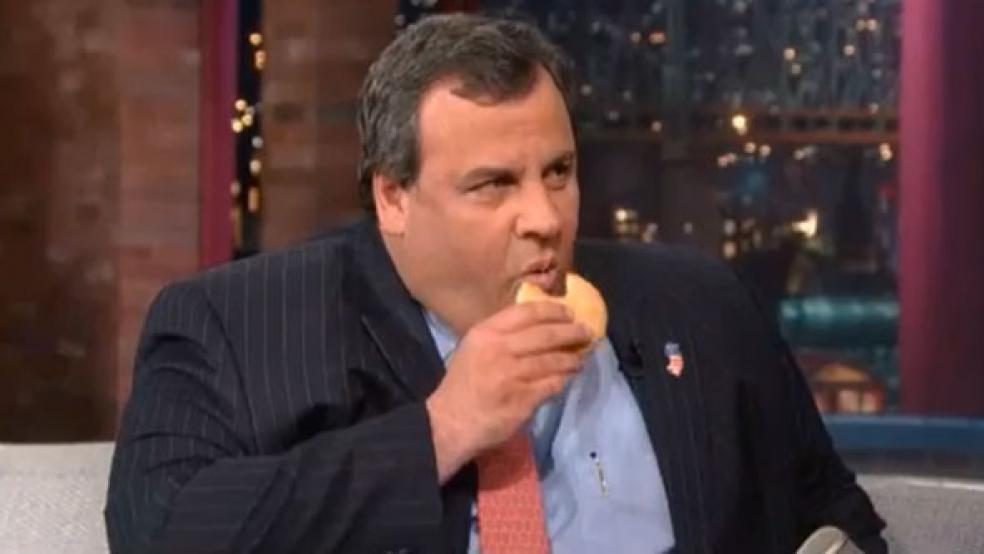Chris Christie, the N.J. governor, can dish all he wants about his weight – but he doesn’t like it when others do, even physicians who once took care of U.S. presidents.
On Wednesday, Dr. Connie Mariano of Scottsdale, Arizona, who served nine years as White House physician (she was Bill Clinton’s personal physician), told CNN she worries Christie could die in office because of his weight – and that he’s at risk of heart attack or stroke.
The plaintalking governor didn’t like that “diagnosis from afar.” He responded angrily that unless Mariano gets on a plane, gives him a physical exam in person and takes his full medical and family history, “she should shut up.”
RELATED: As Obesity Costs Rise Worldwide, Agendas Collide
Christie’s blunt talk is not unexpected – last month he blasted House Speaker John Boehner (R-Ohio) for postponing a House vote on $60 billion of Superstorm Sandy relief. Boehner then reversed course shortly after that. And two years ago Christie told errant New Jerseyians as Hurricane Irene stormed up the East Coast to “get the hell off the beach.”
But Christie can’t blame others for jumping on the weight bandwagon this week since he’s the one who brought it up. A few days ago he appeared on David Letterman and joked about his weight, pulling out a jelly donut and munching on it as everyone laughed.
That was the perfect seque for Letterman to jump in: “From your perspective, from your family’s perspective, your wife, your four kids – do you ever discuss, ‘Oh, maybe I ought to go on a diet’?”
“Every day,” said Christie with a laugh.
Christie later called himself “remarkably healthy.” His blood sugar and cholesterol levels were normal, he said, and he’s in good health. “I’m basically the healthiest fat guy you’ve ever seen in your life,” he said.
But he also said his own doctor has warned him that his luck “is going to run out relatively soon.”
The politics of fat matters in 2013.
Christie can complain about others opining about his weight and say it’s irresponsible. But you’d have to have lived in a cave for the past 30 years to not understand that there are serious health risks – and costs – that result from obesity. As an elected public official often mentioned as a potential Republican presidential candidate, the governor is being disingenuous if he can’t acknowledge that his weight is an issue worthy of political, economic and even fiscal discussion.
If he got out ahead of the issue and led millions of other Americans down the path toward weight loss and better health, he could be instrumental in bringing about a reduction in health care costs nationwide.
RELATED: The Obesity Epidemic: Another $550B in Costs by 2030
Obesity is projected to cost us $550 billion over the next decade, experts say. The national obesity rate is over 35 percent for adults – with big variations between states. A recent report from the Trust for America’s Health and the Robert Wood Johnson Foundation says that if today’s trends continue, in 20 years we could have an obesity rate of 44 percent for adults.
“At every level of government, we must pursue policies that preserve health, prevent disease and reduce health care costs,” said Risa Lavizzo-Mourey, CEO of Robert Wood Johnson Foundation, when the report was published in the fall. “Nothing less is acceptable.”
By 2030, medical costs associated with treating preventable obesity-related disease are estimated to rise by $48 billion to $66 billion per year in the U.S. The loss in economic productivity could even be “between $390 billion and $580 billion annually.” While the medical costs of adult obesity are hard to calculate, “current estimates range from $147 billion to nearly $210 billion per year,” the report said.
Lest anyone misunderstand, it’s not just more exercise that’s needed by huge swaths of our sedentary nation. It’s what we eat and how much we eat. “In the grand scheme of things, daily food intake plays a much greater role than the amount of calories people burn,” Janet Blum, a registered dietician and certified diabetes educator in New Jersey, told The Fiscal Times. “People tend to think that if they just exercise, they’ll automatically lose weight. But in order to lose one pound of fat, you’d have to walk 35 miles, since the average person burns 100 calories a mile and there are 3500 calories in one pound. With that in mind, for an obese person to lose a substantial amount of weight, there would need to be a lot of walking done if eating habits remain the same.”
Blum says that too many of us have poor eating habits, despite the wealth of information at our fingertips. Some of this is economic, to be sure. Low-income individuals tend to eat too many high-fat, high-sodium foods, including processed meats (hot dogs, sausage), and consume too many sugary drinks, including iced tea or juice drinks, instead of water, she says. Also, “a large part of the younger population does not know how to cook.”
Only Governor Christie knows the truth of his eating habits, his medical history, his physical condition. But just think: If a political leader of his stature embarked in 2013 on a serious weight loss journey in front of millions who are also struggling with weight issues – and costing us a bundle in health care costs – he could lead us down a healthier, more responsible and much less costly path than we’re currently on. And become healthier, and almost certainly more popular, while he’s at it.






